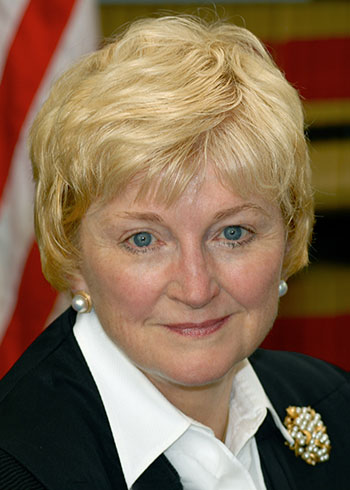
June 4, 2025 – This article is based on an interview Douglas Raines conducted with Justice Patience D. Roggensack in Madison following her retirement from the Wisconsin Supreme Court. Raines served as Justice Roggensack’s Clerk for the 2007-08 term. The content of the interview has been edited for length and clarity. Raines wishes to thank Justice Roggensack for her time and public service to the State of Wisconsin.
Because I know you, I am familiar with your philosophy and how you approach the job of appellate judging, but for the people who don’t know you well, how would you characterize your judicial philosophy or what you believe judges are supposed to do?
Well, the most common thing a justice does is interpret statutes. You have to rely on the words the legislature used. I think the legislature is either A, trying to fix the problem, or B, confer a benefit. That’s why they make laws. That’s my shorthand. So, they’ve got something in mind, but by the time it gets to the courts, somebody’s using the statute in a way that they probably didn’t anticipate. Well, that makes the job of interpreting the words more difficult, but we still do it. If the statute’s unambiguous, we apply the plain meaning of the words. If the statute is ambiguous, then we can look for secondary sources to try to see if there’s something else we should be looking at to interpret the words the legislature used. So those are simple rules.
It’s kind of an Occam’s razor method of judging.
Yes, that’s right. So, I just think that’s what I would say.
I think it’s safe to say the pandemic in 2020 was the first time anyone living encountered something like that.
When it came up, it was the first time in my lifetime that we had anything huge. Now, I know we had the flu epidemic [in 1918], and I’m old, but I’m not quite that old.
When you were Chief Justice, how did you keep the business of the Court moving during the pandemic in 2020 and 2021?
We didn’t know what to do. One thing was for sure, I didn’t want to shut our courts because people need those courts. Their lives go on, whether there’s a pandemic or not. So, I created a task force. It was when things began to shut down and I could see that there was going to be a problem then. The feds were telling us we shouldn’t do anything. I have a biology background, but I’m not a medical expert by any degree. So, I thought, well, I’m just going to ask people throughout the state to gather information and then try to make a recommendation on what should the court do. So that’s why I set up the task force.
 Douglas M. Raines, Marquette Law 2006, is a litigation Partner in the Milwaukee office of Husch Blackwell, LLP.
Douglas M. Raines, Marquette Law 2006, is a litigation Partner in the Milwaukee office of Husch Blackwell, LLP.
They looked at all different things and they gave recommendations that the court enacted. And Wisconsin, I read – I don’t know if this is true because I didn’t do the research behind it – that Wisconsin was the only court system that didn’t shut down during the pandemic. We kept it going.
Randy Koschnick [the Director of State Courts at the time] was hugely helpful. He figured out how we could put everybody on Zoom.
Our main purpose was to keep the courts open and have it safe for those who worked in the courts and those who frequented the courts, either as a juror or a party. So that’s what we did. And I think it worked out fairly well. We didn’t shut down.
What are some of the things you’re most proud of as Chief Justice and as Justice on the Supreme Court? And they can be either institutional or personal.
I was very proud that we got along with each other on a personal level. Now, that doesn’t mean we were best friends. When I came on the Court of Appeals, District 4, we had lunch together once a month at the Madison Club. And the only rule was you couldn’t talk about court business. You could talk about your kids, you could talk about grandkids, you could talk about gardening, but not court business. And what that did was allow us to get to know each other a little bit aside from the work we did.
I think it’s good to get together. You realize people are just people and just because they disagree with you does not make them bad people. They just see it differently. And what’s hot for them and important for them may be different than it is for you.
Do you have a favorite opinion that you wrote?
My favorite opinion is one I wrote as a dissent on the Court of Appeals. It’s State v. Head.[1] And Debra Head was convicted of first-degree homicide in the death of her husband and was sentenced to a very long prison term. She appealed the conviction, and one of her arguments was that the circuit court judge would not let her present any evidence about their past domestic abuse. And she had been hospitalized with a broken collarbone and a broken arm.
When her husband started to come after her, she grabbed a gun, and she shot him until he stopped coming. She called 911 right away. She said what she did, and an ambulance arrived, but there wasn’t anything they could do for him. He was killed.
Well, the judge would not let her introduce all of their history. And I wrote a dissent saying, you know, in life we all judge one another and react to one another based to some degree on our past experience. And her past experience with him was very relevant to whether this was imperfect self-defense. She needed to stop him and she shot him too many times.
But in order to get that in, she had to show what their history was, and the judge wouldn’t let her show the history, so that part of her case just kind of went by the boards. So I wrote a dissent saying, that was error. The jury didn’t know. If the jury had known their past history, they might not have convicted her of first-degree homicide. They might have received a different instruction on self-defense.
That case was picked up by the Wisconsin Supreme Court – I wasn’t on that Court at the time – and the Supreme Court reversed and agreed with the dissent. So, I thought that was pretty good because it’s the first time where history of domestic violence became a relevant fact for prosecution and defense.
Do you have any practice tips for those of us who practice in appellate law primarily?
Don’t ignore the facts. You’ve got to deal with them. You can’t change them when you’re at an appellate level.
And you have to present the law fairly, too, because judges don’t like to get overruled. They work on their cases. You may agree with them or disagree with them on the law, but present it fairly and present the cases on both sides of the issue.
I also think you need to know if the judge you’re arguing in front of is policy-oriented or statute-oriented, if you’re interpreting a statute, and you need to understand that both are ways of looking at the question that’s presented. And you should be prepared to deal with both of them to the extent that you can.
I know that you had young children when you were getting started in your law career. And I don’t know how you were able to balance all of your responsibilities. How were you able to do that?
I had a bit of help. My husband was a physician at St. Mary’s. At that time, they had a lot of nursing nuns. They were our babysitters because when we moved here, Matthew [her youngest child] was just six weeks old. And the nuns loved to come to our home and help with childcare.
When I went to law school, Matthew was five, so he was already in school, but there were times if he had a cold or sniffles, I would call Sister Raphael Clark. She was the one that Matthew dearly loved. And she came out. They were very good to our family and our kids loved them. And the sisters loved them right back.
What are you doing in your retirement?
I’m maintaining my law license, so I will be taking legal education courses.
I always wanted to take French and I never had the time. So, I took my first semester out starting at the end of August in 2023. I took basic French at the university with all the kids, which I dearly loved.
I love to garden.
I’m teaching myself piano. I have two books that were for older beginner students. And so I’m using them to teach myself.
I don’t feel like I’m really retired though. I have to say I miss the intellectual challenge of having a puzzle to solve and colleagues to discuss the puzzle with, which disappears when you’re not a justice anymore. I do miss them.
Serving as an appellate judge was a wonderful opportunity and I treasure every hour of every minute I was there. I was lucky because I got to work with a lot of smart people and noodle through a bunch of really interesting questions. How can you beat that?
Endnotes
[1] 2000 WI App 275, 240 Wis. 2d 162, 622 N.W.2d 9 (Roggensack, J., dissenting), reversed by 2002 WI 99, 255 Wis. 2d 194, 648 N.W.2d 413.
